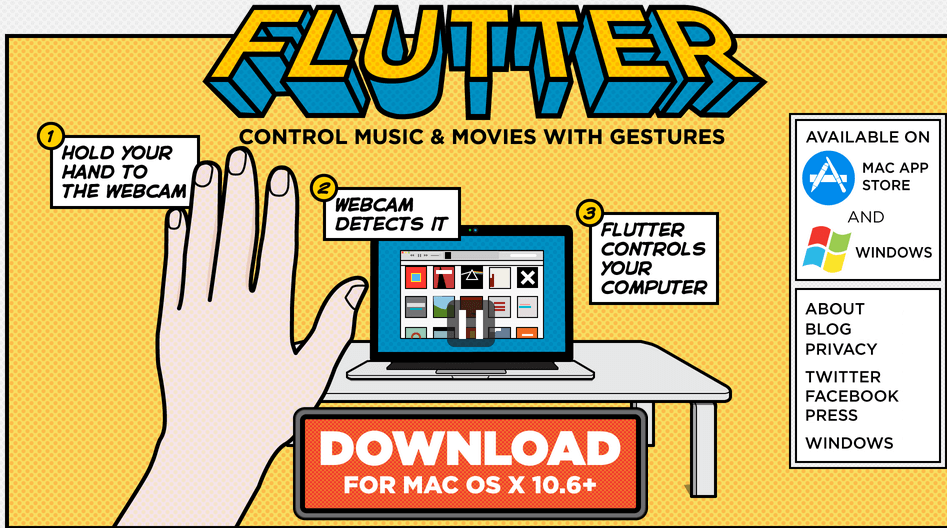Yesterday the internet exploded with reports that Google has acquired Flutter, a start-up focusing on gesture recognition technology for use with PC webcams. Flutter makes software for Windows, Macintosh, and an extension for the Google Chrome browser allowing users with webcams, “to play, pause and skip songs & videos in YouTube, Pandora, Spotify, Grooveshark, iTunes, Netflix, and more. It also allows you to control slide shows in Apple’s Keynote using hand gestures!”
The inevitable comparison is being drawn with Microsoft’s Kinect, Leap Motion, and other popular gesture control technologies for game consoles and PC’s. I think that, for the time being at least, the comparison isn’t adequate, even though the Flutter developers did make the comparison themselves.
The difference is that those other systems involve dedicated motion sensors specialized for the purpose. They are where gesture control technology is ultimately heading. Flutter, on the other hand, attacks the gesture control market by piggybacking on a preexisting and widely adopted technology, one virtually standard for all new PC’s and mobile devices.
So where does Flutter’s technology go from here? Everywhere with a webcam, of course. Flutter will not tell you your heartrate through your skin like Microsoft’s baby, but perhaps we’re not quite eager yet as a society for that kind of thing, not necessarily paranoid (though there is that) but not yet feeling the reason we might want a box that knows how fast your heart is beating. As a gamer I can appreciate the potential there, and as a nerd I can see a lot of other uses including medicine, but then I’m not the average person deciding between an Xbox One and a PlayStation 4. Unless you’re into technology, you probably have no idea why you’d want such a feature, especially for a higher cost or with some hidden catch like that it’s always watching you.
Webcams, however, we have already accepted because they served the purpose of video chatting, even those of us who rarely use them. Average people can get why it might be better to have a webcam than not have one in a pinch. They’ve been an untapped reservoir of potential. Flutter was hardly the first one to the market, there’s been considerable interest in the hidden potential of webcams for many years. What has been lacking is the very thing Google is giving this: scale.
Google can potentially implement Flutter-like gesture technologies across a range of their products: they can make it a standard feature of the Chrome Browser and Chrome OS (and likely will) and Android just for starters, and perhaps their websites as well for users of other browsers and other platforms. This does not require any sort of new technology, adds no hidden costs financially and far less than the All-Seeing-Eye of Xbox in terms of privacy, and a lot of the work has already been done.
What the Flutter acquisition shows is that Google remains, at its core, a web-focused company. For those who want the next generation of Personal Surveillance Device (let’s call a spade a spade, shall we? any gesture control technology involves surveillance, it’s just a matter of type and degree), Microsoft has nothing to fear from Google for now.
For every other company that has attempted to corner the market for tapping webcams as a gesture control technology, it must seem that the Sky Trumpets are crying their doom right now. Google may have just rendered a slew of them obsolete and overpriced. The ability to control popular content sites alone will, for many users, cover a lion share of their usage. Gesture controls across the entire Google ecosystem would virtually cover the internet for some people. Gesture controls for Android could expand that reach to millions more.
Flutter is gesture control as only Google could bring it to the world: available through existing platforms and technologies with wide adoption, focused on the web, coming soon to nearly every computing device millions of people own. Some day the two markets, dedicated gesture controllers and gesture controls that co-opt the webcam, may overlap to the degree that there will be a war between the two approaches (though for all we know, webcams will advance to an equal level by then), but until then Google is positioning itself potentially as the only real game in town for turning a device you already own into one with gesture control technology.
